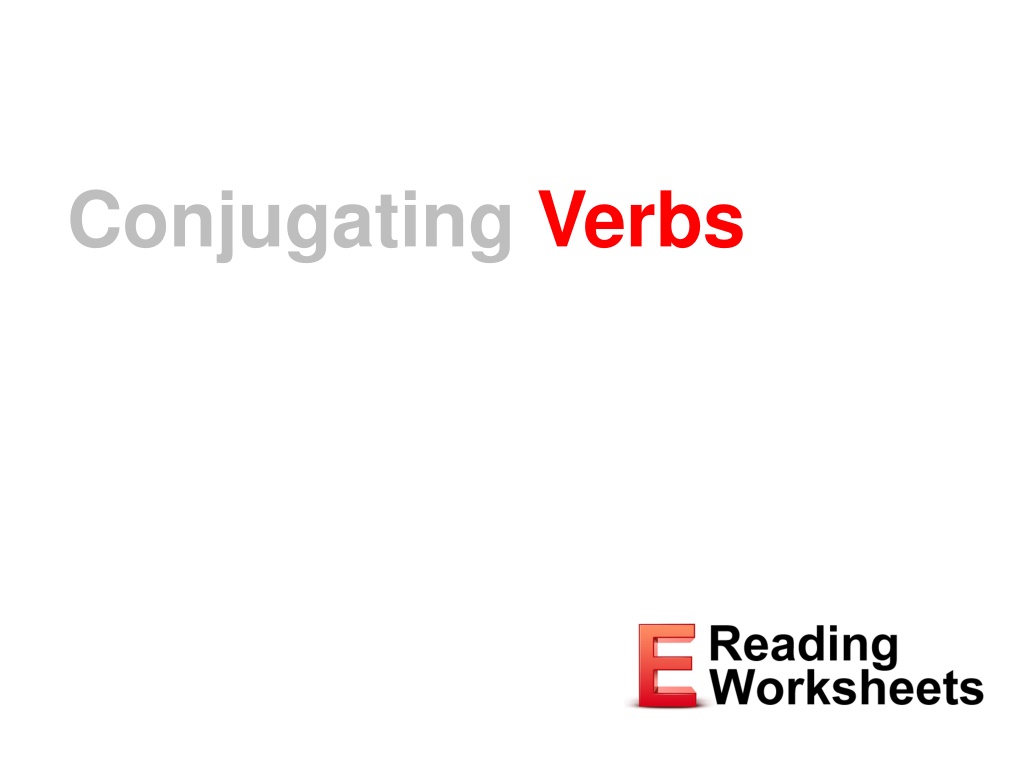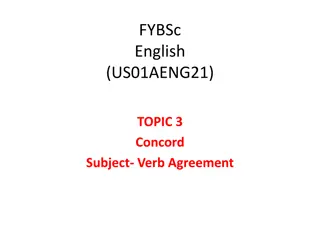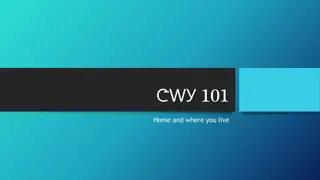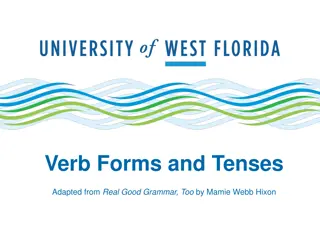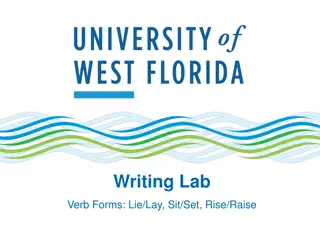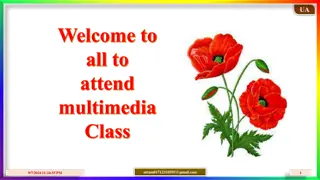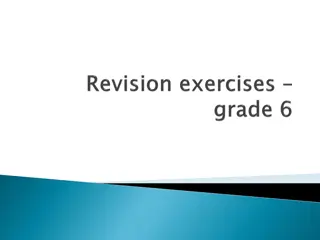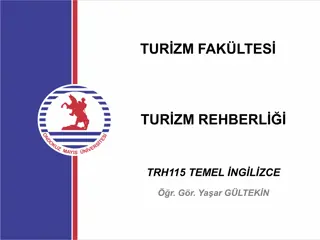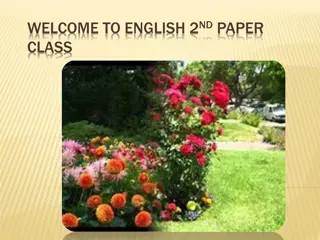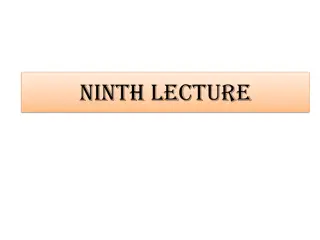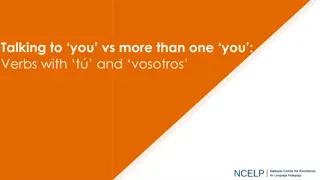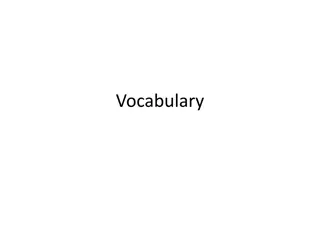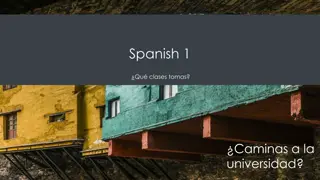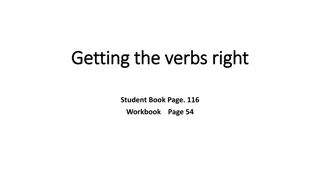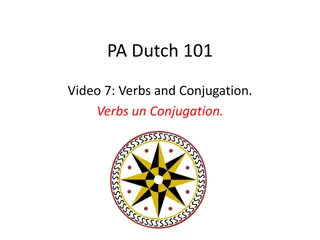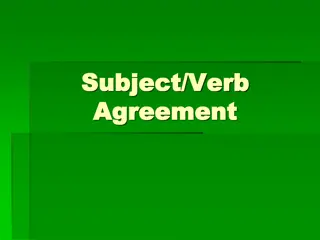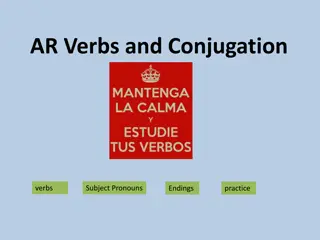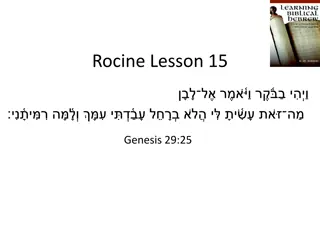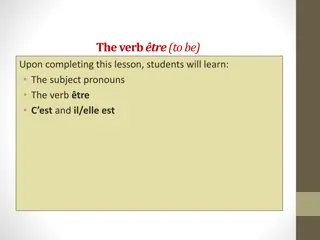Understanding Verb Conjugation in Grammar
Explore the world of verb conjugation in grammar, from changing verb forms to show time and tense to ensuring subject-verb agreement. Learn about helping verbs, statements contrary to fact, and how verb conjugation indicates completion. Dive into this essential aspect of language to enhance your understanding of proper grammar usage.
Download Presentation

Please find below an Image/Link to download the presentation.
The content on the website is provided AS IS for your information and personal use only. It may not be sold, licensed, or shared on other websites without obtaining consent from the author. Download presentation by click this link. If you encounter any issues during the download, it is possible that the publisher has removed the file from their server.
E N D
Presentation Transcript
Conjugate Change the form of a verb Example run run => runs run => ran run => will be running Why are there different forms of run?
Verbs Show Time Conjugation shows when actions occur Example Kendra played basketball. Kendra plays basketball. Kendra will play basketball. We call this verb tense.
Verb Tense Shows whether actions take place in the past, present, or future To Form the Past Tense Add -ed to the verb (usually). Ex: jump => jumped To Form the Future Tense Add will or be going to. Ex: jump => will jump jump => is going to jump
The Subject and Verb Must Agree Verbs change to agree with the subject (the noun that takes the verb) Examples Brian the Brainblob drools acid. Brainblobs drool acid. Why? In the simple-present tense, when the sentence has a singular third-person subject, add an -s to the verb.
Keep Your Eye on the Subject The verb must agree with the subject Students who pay attention to the teacher [ is / are ] going to learn more than students who fall asleep. The subject is the noun that takes the verb.
Helping Verbs Must Agree Too Based on the perspective of the subject 1st-Person Singular 1st-Person Plural 2ndPerson 3rd-Person Singular 3rd-Person Plural I was We were You were He / she / it was They were Past I am We are You are He / she / it is They are Present I am going to be We are going to be You are going to be She / he / it is going to be They are going to be Future
Statements Contrary to the Fact Use the helping verb were instead of was Examples If I were principal, recess would be after lunch and before lunch. Watch for wish and if
Conjugation Shows Completion Verbs can show whether an action has been completed or is ongoing Example The boys were finishing their project. The boys have finished their project. We call this aspect.
Simple Aspect Simply in the past, present, or future Simple Past Krag conquered the planet Crouton. Simple Present Krag conquers the planet Crouton. Simple Future Krag will conquer the planet Crouton.
Progressive Aspect An action that was, is, or will be in progress Past Progressive Brother Tao was meditating. Present Progressive Brother Tao is meditating. Future Progressive Brother Tao will be meditating. Progressive Aspect Always Has: Helping verb + verb + ing
Perfect Aspect Referring to a completed action or event Past Perfect Squirrel had already packed his bags. Present Perfect Squirrel has already packed his bags. Future Perfect Squirrel will have already packed his bags. Perfect Aspect Always Has: Have, has, or had + past participle
Irregular Verbs Some verbs are hard to conjugate For example: see Simple Progressive Perfect I saw. I was seeing. I had seen. Past I see. I am seeing. I have seen. Present I will be seeing. I will have seen. I will see. Future
Examples of Tense and Aspect Milo the Monkey King was tumbling in the Tumtum tree. What is the tense and aspect of the above sentence? Past Progressive
Examples of Tense and Aspect Kung has mastered the deadly art of the flying frog. What is the tense and aspect of the above sentence? Present Perfect
Examples of Tense and Aspect I ll be crying in my room. What is the tense and aspect of the above sentence? Future Progressive
Review Verbs are conjugated to agree with the subject and to express time. Verbs show whenthings happen and if these actions have been completed. Progressiveaspect is for actions that were, are, or will be in progress. Perfectaspect is for referring to completed actions from the past, present, or future.
